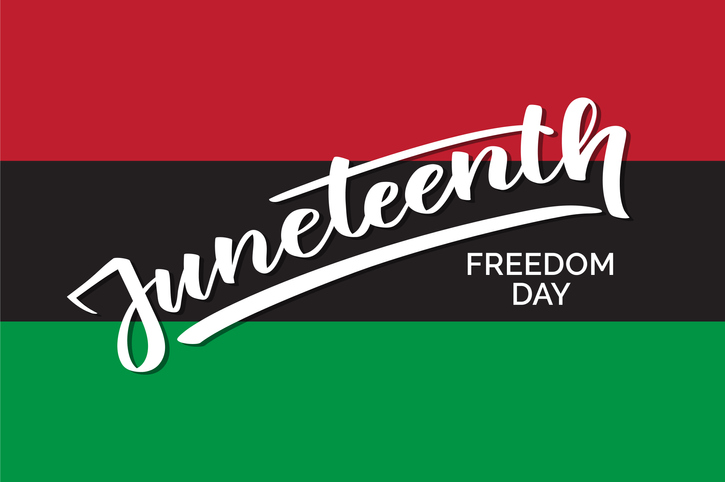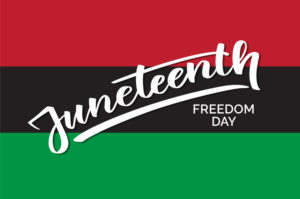
Why is Juneteenth Becoming a Big Deal?
Juneteenth, observed June 19 each year, has a long history of commemoration among African Americans in the United States. It has been observed by Black people in Galveston, Texas and the immediate surrounding area for generations. But within the past few years, Juneteenth has become a national Black holiday. This year, I have seen advertisements for Juneteenth merchandise, Juneteenth celebrations, and Juneteenth marketing from major corporations and institutions. Why is this small commemoration that was lost from mainstream history now becoming such a big deal in the media? I offer a few observations that I believe are making Juneteenth the new national Black summer holiday.

Juneteenth commemorates the day when former slaves in Galveston received the news that they had been freed after the U.S. Civil War on June 19, 1865. President Abraham Lincoln had issued the Emancipation Proclamation freeing slaves in rebelling states under Confederate control two years prior, in 1863. The Union Army won the Civil War, making that action permanent, and Congress officially freed all slaves through the thirteenth amendment in January of 1865. But because Texas was the westernmost former Confederate territory and Galveston an island in the far south of the state, it took a long time to bring the news to the Union Army from the battlefields in the southeastern United States of America. The soldiers shared the news that the over 250,000 formerly-enslaved Africans in the state of Texas were free on Juneteenth. As a result, to the Black community starting in Texas and spreading over the decades, Juneteenth became a second Independence Day for African Americans–the day that the last slaves received freedom. But why is Juneteenth going viral now when it wasn’t even on most Americans’ radar a decade ago?
Black Pride Is Making A Resurgence
In the post-Obama era, it became clear that a backlash of White supremacy would continue to expose racism at the individual and systemic levels across the nation. While literal chants of White power became more prevalent in cities across the United States, African Americans who had in many cases taken a position of assimilation were faced with a choice to feel uncomfortable and complicit with the societal racism around them or respond with messages and attitudes of Black empowerment and self-determination.
This was, of course, not a new choice or a new phenomenon. There was a similar dynamic of racial tension after WWI that gave birth to the Red Summer of 1919, the Tulsa Massacre of 1921, and the resurgence of the KKK codified in the film Birth of A Nation. In response, the Harlem Renaissance provided a focus of Black empowerment and self-determination in the midst of the Great Migration. This happened again during the Black power movement after the hope of the Civil Rights era ended in Rev. Dr. Martin Luther King Jr. and Malcolm X’s assassinations, as White Americans pushed back against integration around the nation. In response, African Americans embraced Black power, which fueled reinvestment in Black communities, the creation of Black political parties, and the beginning of Black theologies. In our current historical moment, the Black disengagement from White systems has looked like reinvestment in HBCUs, the proliferation of Black businesses, and Black artists creating Afro-centric art and entertainment. It has become meaningful to be “Black Black” again, and to embrace African American identity in every layer of culture. Juneteenth has become a national way to celebrate Black Identity at the moment when the COVID-19 pandemic is becoming manageable and society is opening back up.
Black Lives Matter Is Mainstream
In the wake of George Floyd’s murder and the global pandemic that gave it context, Americans were forced to pay attention to the ongoing racism and trauma that Black people face on a daily basis. The Black Lives Matter movement, which began in 2015 after the killing of Michael Brown by police officers in Ferguson, Missouri, has reached mainstream status in a remarkably short time as a result of mass organizing, social media, and the focus created by the pandemic. This was now most evident in the outcry of support for Black Lives Matter in mainstream sports, business, and government during the summer of 2020 after the deaths of George Floyd and Breonna Taylor–which served as major catalysts for hundreds of non-violent protests on behalf of Black lives globally. People of every background across racial lines came together to protest the unjust treatment of Black Americans. As major corporations and politicians became aware of the demographic and economic trends supporting Black Lives Matter and more and more stories of black people losing their lives at the hands of police and vigilantes came to light, a flurry of companies and politicians rushed to voice their support in an election year where police brutality and racism became major topics of conversation.
That political and socioeconomic force has continued in the sometimes unbelievable turnarounds of institutions that now publicly voice support against racism and for Black Americans. With the demographic winds in favor of supporting Black lives and billions of dollars to be made in voicing support, Juneteenth has provided another opportunity for institutions to be caught on the right side of history and the economy.
Black Institutions Are Promoting It
Juneteenth has become a reason for celebration and remembrance for Black institutions around the country, most notably Black churches. Black churches and denominations who have lived under the specter of White evangelicalism have begun to disentangle themselves from White Christianity in the last few years Because of the political and cultural loyalty to racism many White evangelical personalities and institutions have shown, reclaiming Blackness while being Christian has become more pronounced. Black Churches are hosting Juneteenth panels, celebrations, festivals, and even economic empowerment events. Friendship West Baptist Church outside of Dallas has facilitated weeks of events remembering the Tulsa Massacre and now celebrating Juneteenth. Black churches are finding creative ways to come together virtually, outside, in hybrid ways, or returning to in-person worship after the pandemic. Black companies, schools, and organizations are finding key events to gather and build engagement and morale as recovery from the pandemic continues. Juneteenth has provided the perfect summer outlet for Black institutions to promote events and gatherings affirming their African American heritage.
Black institutions now empowered by social media are still the best at convening Black people across the country. Juneteenth, which celebrates the freedom of all Black people from slavery, has become an opportunity to celebrate the freedom of all Black people to enjoy ourselves and determine our direction after the pandemic.

Juneteenth may not have been on the minds of most Americans a decade ago, but it is in the mainstream media and the minds of the masses today. The transformation from commemoration and celebration for formerly enslaved Africans to a national holiday for Black folks has been more than a century in the making. The recent interest has been driven by cultural, economic, political, and social factors; but there is a spiritual reformation happening in the midst. Juneteenth has provided an opportunity for Black people to celebrate intentional Blackness in their faith expressions. And as a Black man in America, I am glad more people are saying out loud “I’m Black, free, and proud.”
